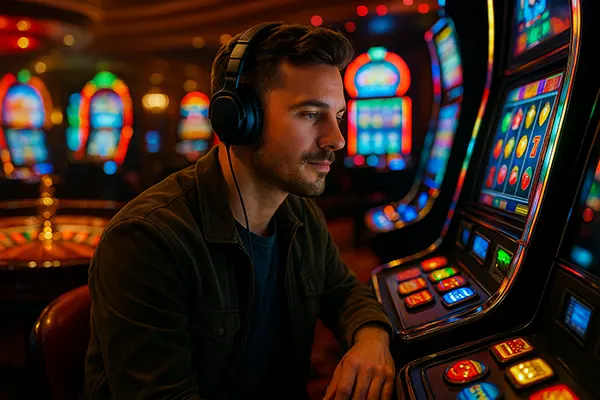Soundtracks of Rituals: How Music Shapes Gambling Routines

In modern gambling environments, sound has become as important as visual design. The melodies, jingles, and background tracks used in casinos and online games are not chosen randomly. They form an invisible structure of routine, guiding players into a specific state of mind. Music does not simply entertain; it acts as a ritualistic element that signals the beginning of play, builds emotional tension, and prolongs engagement. Understanding how these soundtracks influence human behaviour reveals the depth of psychological design behind gambling routines.
The Ritual of Beginning
In gambling, starting a game is rarely a neutral act. The moment is often accompanied by a specific sound, such as a short melody when spinning a slot reel or a signature jingle when entering a live room. These musical cues work like mental triggers, setting the brain into a familiar rhythm. Research in behavioural psychology highlights that repeated sound patterns become strongly associated with certain actions, forming conditioned responses. In 2025, many casinos deliberately integrate musical intros to establish this sense of ritualised initiation.
These auditory signals are designed not just for recognition but for creating anticipation. The short burst of sound at the beginning of a game produces a feeling of readiness, stimulating dopamine release in the brain. This biochemical reaction is not accidental; it reinforces the expectation of reward, even before the first card is dealt or the wheel is spun. Over time, this conditioning creates an automatic desire to engage with the game once the trigger is heard.
Another layer is cultural influence. Many operators choose melodies with universal appeal, such as orchestral flourishes or digital tones resembling fanfares, to connect with global audiences. The sound of “starting” is standardised, so players worldwide share a common auditory ritual that links them instantly to the act of gambling.
Psychological Triggers Behind Sounds
Music in gambling does not merely fill silence; it sets the emotional framework. Slow-paced melodies are often used in moments of suspense, while upbeat rhythms accompany wins or bonuses. This careful selection builds a cycle of tension and release, maintaining player engagement. Studies in 2024 and 2025 confirm that sound environments directly influence time perception, with players often underestimating how long they have been engaged.
The impact of soundtracks is especially strong when paired with repetition. For example, the consistent use of the same jingle during free spins in slot games makes the experience feel predictable and comforting. Players begin to associate the melody with positive outcomes, strengthening the urge to continue until the sound is triggered again. In essence, the melody itself becomes a reward, layered on top of financial incentives.
Importantly, these sounds are designed not to distract but to blend seamlessly with gameplay. The balance of volume, rhythm, and tone ensures players remain immersed without conscious recognition of manipulation. This subtlety is key: the less players notice the soundtrack as an external element, the more it integrates into their personal gambling routine.
Music as a Structural Element of Gambling Routines
Beyond initiation, music sustains the rhythm of gambling sessions. The constant repetition of background tracks creates a predictable environment, which is psychologically reassuring. Just as rituals in daily life provide comfort through familiarity, repetitive melodies reduce uncertainty and keep players anchored in the flow of the game. This effect is particularly evident in slot machines, where loops of sound are intentionally short and continuous.
Another dimension is emotional regulation. Music supports both excitement and calmness, depending on the moment. In periods of loss, neutral or soft background tracks prevent frustration from escalating, while in moments of success, energetic music amplifies the emotional high. In this way, soundtracks stabilise the emotional journey, making gambling sessions feel smoother and more cohesive.
Research published in 2025 indicates that music also contributes to the perception of control. When familiar melodies repeat, players report feeling “in sync” with the game, as if they understand its rhythm better. This illusion of predictability fosters persistence, encouraging longer playtime even when outcomes are random.
Creating a Sense of Continuity
Casinos and online operators use sound not only as decoration but as a strategic tool to build continuity. By repeating specific motifs throughout different stages of the game, they link separate experiences into a unified whole. The same jingle may appear when depositing funds, starting a game, and triggering a bonus, creating a seamless auditory journey.
Continuity through sound also strengthens brand identity. In 2025, leading casinos increasingly develop their own proprietary sound libraries, ensuring that players associate certain melodies exclusively with their services. This branding strategy means that even outside the game environment, hearing a familiar sound can trigger memories and the urge to return.
Ultimately, the sense of routine formed by music is less about individual sounds and more about consistency. Players rely on predictable auditory cues as anchors, and this structure makes gambling feel like a repeated ritual rather than a series of disconnected events.

The Future of Sound in Gambling Rituals
As gambling technology evolves, sound design is becoming even more sophisticated. In 2025, many developers experiment with adaptive soundtracks that change in real time, responding to player behaviour. For example, music may grow more intense as bets increase, or shift to calmer tones when activity slows. These dynamic systems deepen immersion and personalise the ritual of play.
Artificial intelligence also plays a growing role. By analysing player responses, AI can adjust tempo, volume, and style of music to maximise engagement. This level of personalisation transforms soundtracks from static background features into active participants in the gambling experience. Players no longer just hear the music; they interact with it.
Finally, there is increasing attention to responsible design. Regulators and researchers in 2025 highlight the need to balance engagement with player well-being. Some operators now experiment with subtle musical cues to encourage breaks or signal session limits. The same psychological triggers that once prolonged play can also be used to promote healthier gambling habits.
Ethical Considerations in Sound Design
While music enhances ritual and immersion, its manipulative potential raises ethical questions. Designing soundtracks to prolong play touches on issues of responsibility and fairness. In response, regulators in several European markets have introduced guidelines requiring greater transparency in audio design.
Some gambling operators are proactively adopting measures to prevent harm. For instance, they introduce neutral or even slightly dissonant tones after prolonged play, disrupting the cycle of continuous excitement. These interventions are subtle but signal a growing awareness of the balance between commercial goals and player protection.
The future of sound in gambling will likely be defined by this tension between immersion and responsibility. As technology advances, operators will need to ensure that soundtracks not only enhance routines but also respect the boundaries of safe play.
